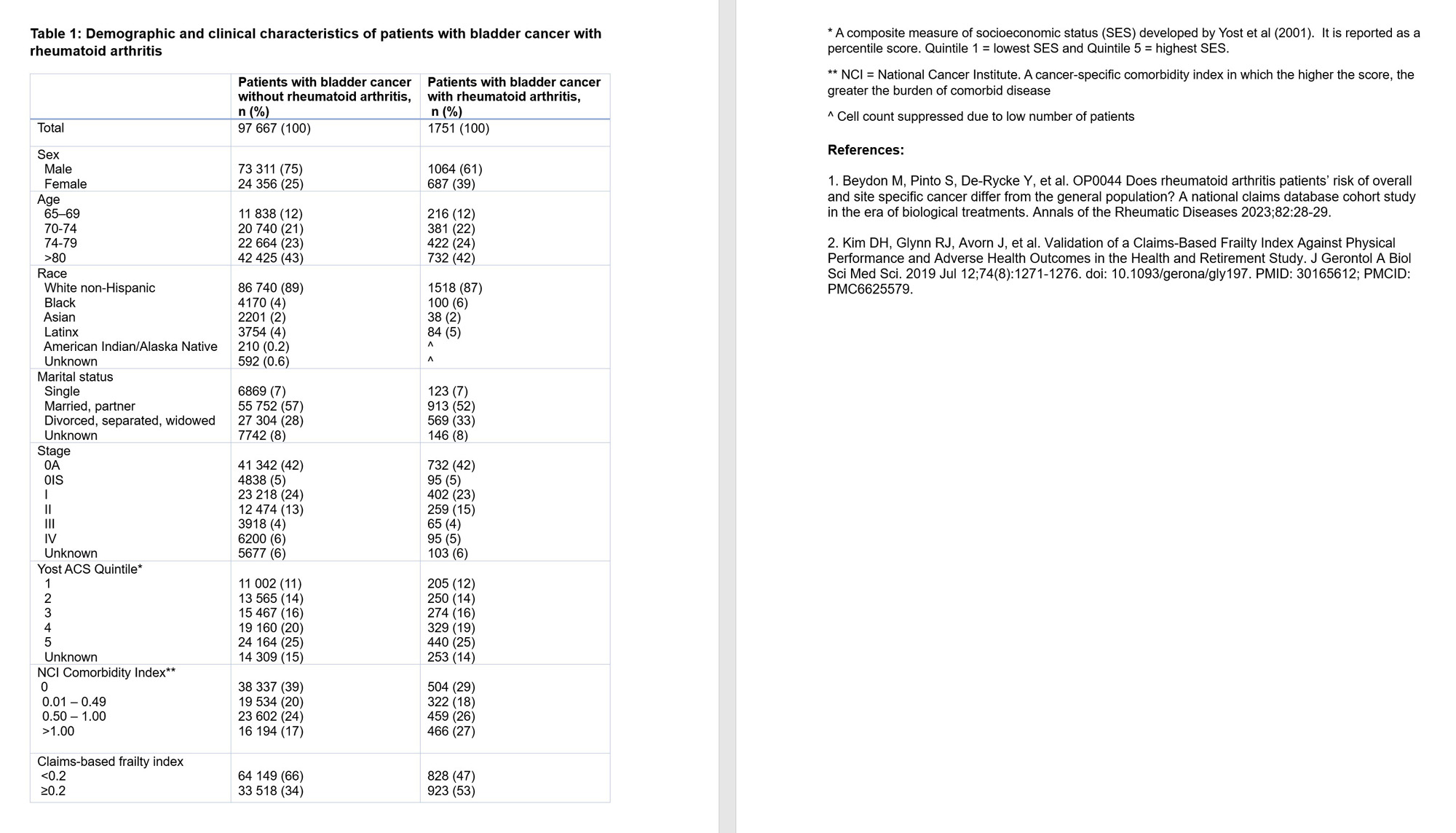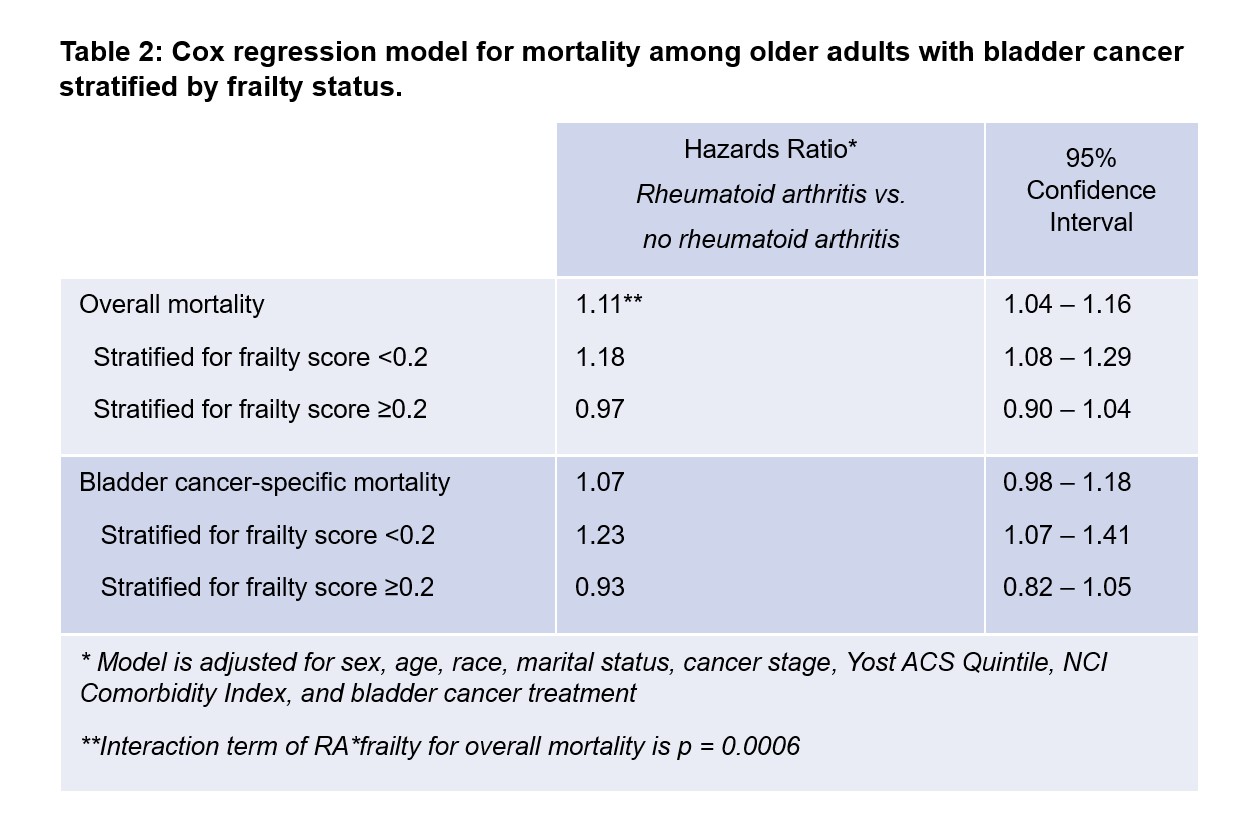Session Information
Date: Tuesday, November 14, 2023
Title: (2095–2140) RA – Diagnosis, Manifestations, and Outcomes Poster III
Session Type: Poster Session C
Session Time: 9:00AM-11:00AM
Background/Purpose: Rheumatoid arthritis (RA) is associated with an increased risk of developing certain cancers, including bladder cancer (Beydon et al. 20231). However, few studies have examined the outcomes following a bladder cancer diagnosis in patients with RA. RA is also associated with an increased risk of frailty. Bladder cancer is the second most common urologic cancer with a mean age of diagnosis of 73 years and a high burden of frailty and comorbidity. Importantly, among patients with bladder cancer, frailty is associated with an increased risk of mortality. We sought to evaluate associations between RA and all-cause and cancer-specific mortality in older adults with bladder cancer, adjusted for frailty.
Methods: In this retrospective cohort study, using the Surveillance Epidemiology and End Results cancer registry and linked Medicare claims data (SEER-Medicare), we included patients ³65 years old with incident bladder cancer diagnosed between 2004 and 2017. Patients with a pre-existing diagnosis of RA were identified based on the presence of ³2 ICD-10 codes ≥ 30 days and < 365 days apart. A validated claims-based Frailty Index (Kim et al. 20172) and National Cancer Institute (NCI) Comorbidity Index were derived from claims in the 12 months prior to bladder cancer diagnosis. Patients with a frailty score > 0.2 were categorized as frail. Separate Cox proportional hazards regression models evaluated the association between RA and frailty and 1) overall mortality and 2) bladder cancer-specific mortality, after adjusting for demographics, socioeconomic status, comorbidities, cancer stage, and receipt of guideline-directed bladder cancer treatment per stage. We evaluated the interaction between RA and frailty and performed stratified analyses by frailty status.
Results: We identified 99,418 patients with bladder cancer of whom 1751 (1.8%) had pre-existing RA (Table 1). Among patients with RA, 923 (52.7%) were frail while 33,518 (34.3%) of patients without RA were frail (p< 0.0001).Median follow-up for survivors overall was 5.3 years (interquartile range, IQR, 2.8-8.8) during which time 61,499 patients died. The 5-year overall survival was 73.0% versus 71.9% for patients with and without RA respectively (p< 0.0001) and was 73.0% versus 68.6% for patients with and without frailty (p=0.0001).Among non-frail patients, RA was associated with an increased risk of cancer-specific (aHR 1.22, 95% CI 1.07 – 1.41) and overall mortality (aHR 1.18, 95% CI 1.08-1.29) (Table 2). However, among frail patients, RA was not associated with an increased risk of cancer-specific (aHR 0.92, 95% CI 0.82 – 1.05) or overall mortality (aHR 0.97, 95% CI 0.90-1.04).
Conclusion: RA was associated with a higher risk of bladder cancer-specific and overall mortality in non-frail pts with bladder cancer. Limitations of our study include retrospective nature, potential selection bias, and unmeasured confounding. Our hypothesis-generating results support further evaluation of the association between RA, frailty, and survival in older adults with bladder cancer.
To cite this abstract in AMA style:
Swaminathan M, Holt S, Gore J, Nyame Y, Wright J, Schade G, Shah A, Sparks J, Makris U, Grivas P, Suarez-Almazor M, Psutka S, Singh N. Associations Between Rheumatoid Arthritis, Frailty Status and Mortality in Older Adults with Bladder Cancer [abstract]. Arthritis Rheumatol. 2023; 75 (suppl 9). https://acrabstracts.org/abstract/associations-between-rheumatoid-arthritis-frailty-status-and-mortality-in-older-adults-with-bladder-cancer/. Accessed .« Back to ACR Convergence 2023
ACR Meeting Abstracts - https://acrabstracts.org/abstract/associations-between-rheumatoid-arthritis-frailty-status-and-mortality-in-older-adults-with-bladder-cancer/


